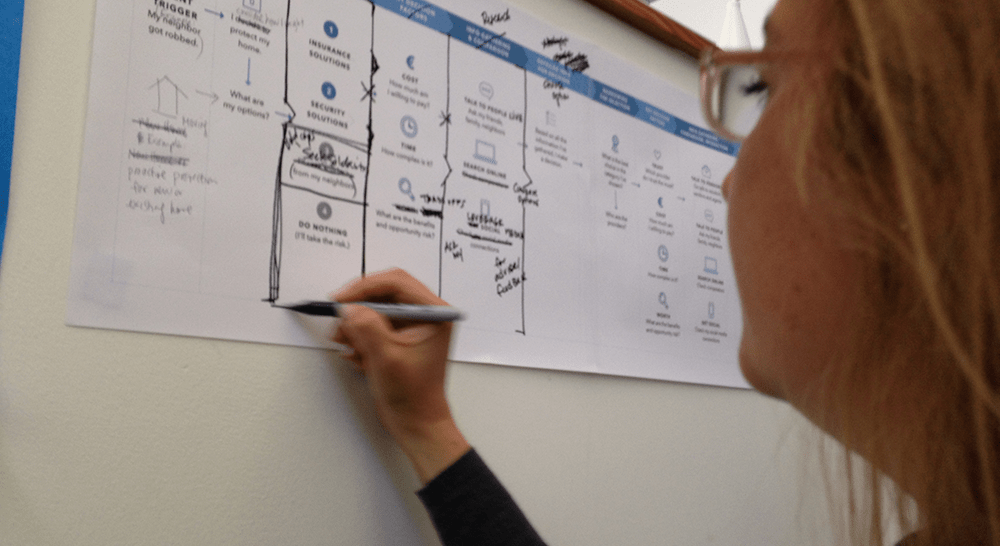
UX Lex
An evolving, interactive glossary of UX research terms.
It's ironic. Those of us who work in UX, user researchers included, aspire to create terrific user experiences. That’s what we do. But what we have done with our own terminology is to create a mess. Eighty UXers from around the globe began to address that problem in September 2019. Here is a sneak peek of that work. More details, and full credits, to come. Sign up here to get weekly terms in your inbox >>

Likert Scale
The Likert Scale is named after its inventor, psychologist Rensis Likert. It was originally a 5 or 7 point survey scale used to measure variations of attitude, perception…

Market Research (MRX)
Market research is the process of gathering information about people/target audience (consumers, customers, users, prospects, etc…

Marketing Research
Marketing Research is defined as the influence, reach, and execution of marketing actions, to learn more about the behaviors, interests, or any other…

Mental Model
Each person has their own mental model that represents the way they think, feel and/or behave in regards to everything. They are based on beliefs…


Moderator (for Research)
A moderator is the person who conducts or facilitates 1:1 interviews, or other type of research sessions (e.g. group discussion). They build rapport, apply strategies …

MVP / Minimum Viable Product
The simplest core feature set of any product or service. It’s used in the product development process to represent the initial version of what is being created, to enable testing …

Note Taker
A dedicated attendee in a qualitative research session whose role is to record what the participant(s) is expressing …

Pain Point
A problem that could be a challenge, hiccup, inconvenience, annoyance, barrier or other issue, occasional or persistent, however big or small, that customers or prospects experience at different points in the product or service journey.

Participant Pool
There are many interpretations of this term. For the purposes of the UX Lex, it refers to the people who have consented to take part in one specific, or a number of research studies, which may or not be on the same topic. It is also a stage in the recruiting selection process.

Participatory Design
Participatory design, also known as co-design, is an approach to design that brings customers and/or stakeholders and/or subject experts together into the heart of the design process. Participatory design can be used during initial discovery …


Primary research
Primary Research can be a quantitative research and/or qualitative research study commissioned to gather first-hand feedback directly from or about a defined audience(s). The data is owned and controlled


Qualitative Research
Qualitative research originated in the social behavioral sciences (e.g. sociology, anthropology and psychology). Today, in the context of business, qualitative methods…

Quantitative Research
The purpose of quantitative research is to generate research study responses that can be counted, in order to project results for a larger population…

Recruiting/Recruitment
Recruitment is the process of identifying and finding research participants who meet a set of predetermined criteria that define the profile of the desired audience to take part in a research study. Recruitment is critical to all types of primary research because recruitment …

Sample / Sampling
Sampling has different meanings in quantitative and qualitative research. In quant, it refers to the people or data that is researched or sampled. The sample is a subset of the whole intended to be extrapolated to represent the whole. Characteristics of the subset …

Screener / Screening
A questionnaire designed to qualify whether potential research participants are eligible for a study based on the research goals. It is a filtering process based on a set of criteria that define the desired target audience and is a key first step in the recruiting process before they can be included …

Secondary research / desk research
Research conducted by gathering and reviewing data from existing sources. When you want to gain an understanding about any topic - including but not exclusively product, market, audience, …
Looking to get involved? Great!
Enormous accolades to the dozens of people who have already contributed to this work.
WE ARE ACTIVELY LOOKING FOR PEOPLE TO SUPPORT THIS INITIATIVE!
Share feedback on these definitions and any terms we may be missing. Learn about project sponsorship and advertising.
Have another idea or question? Great! Send us a note.

